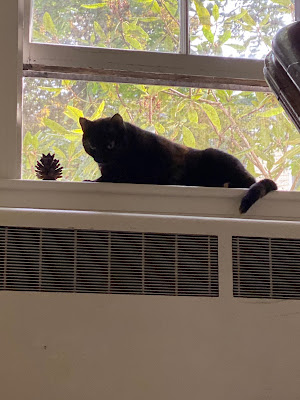Sunday, August 2, 2020
Tonight's picture was taken in August of 2009. Mattie was in the hospital and struggling. Managing intense pain and gasping for air to breathe. Not to mention that his abdomen kept filling with fluid, as his cancer was taking over. On Mattie's dry erase board in his room, we posted a few things to brighten his day. One was a drawing from his good buddy Kazu and the other drawing was from Holly (one of Jocelyn's sisters; Jocelyn was Mattie's cancer buddy and mentor). The third posting was a photo of the Lego master builders who Mattie met and worked with at the Lego store on August 9, 2009.
- number of people diagnosed with the virus: 4,657,207
- number of people who died from the virus: 154,779
I have been highlighting Sunny on the blog and I did not want to leave out Miss Indie. We have placed one of Indie's perches by our bedroom window. We thought she might like being up higher off the ground and with a good view (as there is a big oak tree outside the window which gets a lot of bird traffic). After several weeks of trying to introduce her to the new space, she is finally going there on her own. A real cat!
I was listening to the radio today and heard the term "COVID fatigue." It caught my attention because I can absolutely relate to this new coined term. So I decided to look it up on the internet. COVID fatigue has been applied to both survivors of the virus as well as to people (unaffected by the virus) living their everyday lives in lock down. For survivors, apparently many of them face chronic fatigue for weeks and monthly after diagnosis. Symptoms such as profound exhaustion, trouble thinking or remembering, muscle pain, headaches, and more. Frankly this is not surprising to me as there are many diseases out there (cancer being one of them) that trigger these same long term affects on the patient and family members.
For the purposes of this posting, I am focusing on COVID fatigue experienced by many of us, who were not diagnosed with the virus. The article is entitled, COVID fatigue is hitting hard. Fighting it is hard, too, says UC Davis Health psychologist
For the most part I understood the intentions of this psychologist, until in big bold letters I saw..... ABNORMAL IS THE NEW NORMAL. Really? I hated the term new normal when Mattie was diagnosed with cancer, and I equally despise it now. Nothing abnormal or forced upon us should ever be accepted as a NEW NORMAL, period. Putting this aside, I do agree with her, that intense stress and prolonged stress can have devastating long term effects on our physical and mental health. I saw that personally with Mattie's cancer journey and I am observing it now in people all around me impacted by the psychosocial ramifications of a five month lock down.
The article continues on by discussing the stages of disaster stress. Meaning stages people go through when faced with a disaster. The first being that communities come together to support each other. We may see acts of kindness from those around us. I get what she is reporting, but I can safely say I did not experience this where we live, in the middle of the city. After this kindness stage, comes the disillusionment phase. Which is where we are now as a society, in which we have lost our optimism and start to have negative or angry reactions. Specifically the article points out that:
- “Many people are exhausted by it all.”
- “Some are saying they don’t care if they get COVID-19. They’d rather risk getting sick than stay home or be careful."
- "Others have simply stopped listening to health leaders and science.”
Any and all reactions to prolonged stress are understandable to me. Yet how do we cope with our feelings and reactions while still maintaining our own safety and the safety of those around us? This is the BIG question and I am sure the answer is different for all of us. But two things I know are mentioned in the article and that I have found helpful and these are: 1) walking and 2) talking. Things that Peter and I do daily. Sunny is truly our mental health puppy! He gets us out, exploring, engaging, and talking regardless of the weather. However, I do not discount gratitude either, which was also mentioned in the article. Having seen Mattie get diagnosed with cancer and die, and watching my dad deal with his own health issues, I have learned that if you have a healthy day in your life, it is a gift. I do not take it for granted and though I would be the first to tell you I HATE lock down and wearing a mask, I am aware of what I do have...... my health and the safety of our home.





































